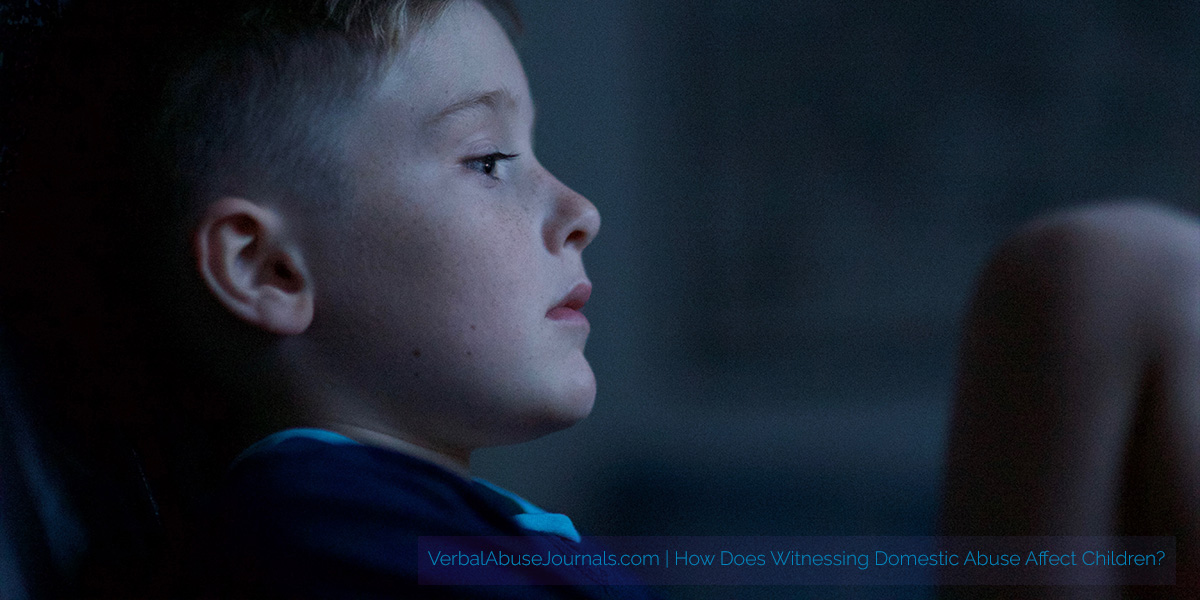You can’t protect your children from witnessing domestic abuse if you’re in an abusive relationship. And the effect of witnessing domestic abuse is harmful in the short and long-term picture. You may think that because the kids are asleep or even at a friend’s house that they can’t witness abuse. That just isn’t so. You can’t protect them from this monster; abuse lives under the kids’ beds, too.
I stayed in my abusive marriage for 17+ years, thinking that I could protect my sons from harm. It wasn’t until near the end of my marriage that I realized my contributions to the hell they grew up in. It didn’t matter how valiantly I thought I protected them. The damage was done.
Hopefully, I can help heal some of the pain they suffered by educating them and taking responsibility for my part in their upbringing. It’s been years since I left their father, but I feel there is a long way to go before both my sons are mentally and emotionally healthy.
What Does ‘Witnessing Domestic Abuse’ Mean?
The Domestic Violence Roundtable1 defines witnessing domestic abuse as:
…seeing actual incidents of physical/and or sexual abuse. It can mean hearing threats or fighting noises from another room. Children may also observe the aftermath of physical abuse such as blood, bruises, tears, torn clothing, and broken items. Finally children may be aware of the tension in the home such as their mother’s fearfulness when the abuser’s car pulls into the driveway.
What Feelings Do Kids Carry After Witnessing Abuse?
Children who witness domestic abuse may feel:
- afraid, on guard
- isolated
- vulnerable
- worried for themselves, their siblings, and the abused parent
- worthless
- powerless
- guilty
- ashamed, embarrassed
- angry (both at the abuser for hurting the other parent and at the abused parent for not being able to end or prevent the abuse.)
Children may feel severely depressed and anxious, to the point of needing a doctor and therapist to help them.
Kids may do poorly in school due to:
- a short attention span
- an inability to concentrate
- acting out
- withdrawal
- depression and/or anxiety
- abandonment (Parents are neglectful because one struggles to survive and the other struggles to keep control.)
Long-Term Effects of Experiencing Domestic Abuse on Children
- Children from abusive families have a higher risk of substance abuse, posttraumatic stress disorder (PTSD) and juvenile delinquency.
- Witnessing domestic abuse is the number one reason children run away.
- When boys witness the abuse of their mothers, they are more likely to abuse female partners. Girls raised in abuse may come to believe that abuse is normal (she either accepts abuse from her partner or acts as the abuser).
- Children raised in abuse may think violence is an appropriate response to conflicts.
- Kids tend to identify with strength (or what works). Eventually, children may lose respect for the abused parent and side with the abuser.
- The children could respond aggressively, even violently, to the abused parent and others.
Possible Physical Responses to Witnessing Domestic Abuse
- Children may suffer multiple types of sleep disturbances and sleep problems.
- Stomach aches, headaches, and bedwetting are common.
- Some children will intervene and suffer the direct consequences of emotional abuse or physical violence.
- Children who witness abuse may show developmental delays in speech, motor, or cognitive skills.
- Some kids may engage in self-harm (cutting, burning, or worse)
Your Child’s Exposure to Domestic Abuse Is Within Your Control

So, you tell me. How dangerous to your children’s mental and physical health is witnessing domestic abuse? How important is it to leave your abusive relationship now that you know? Your children cannot escape the abuse without your help. Even if you leave the relationship and have to share custody with your abuser, your children will have at least one safe home. One safe home can make a great difference to your children.
Honestly, I don’t know how much good knowing how witnessing domestic abuse would have helped me when my marriage and children were young. But if I had support, maybe I could have left my abusive marriage years before. However, you have access to verbal and emotional abuse support. All you have to do is ask for it at The Verbal Abuse Journals Mentoring Program or visit the National Domestic Violence Hotline.
Source
1 DomesticViolenceRoundtable.org — The Effects of Domestic Violence on Children
Featured photo by Luke Pennystan
Similar Pages
- Am I Abused? (A Quiz)
- Are Abusers Mentally Ill? If So, What Do I Do About It?
- Are Abusers Typically Men? Let’s Stop Assuming They Are
- Can You Be Financially Abused If You Have Money?
- How Do I Stop Emotionally Abusing My Wife?
- How Does Witnessing Domestic Abuse Affect Children?
- My Abuser Has PTSD. What Do I Do?
- Was I Abused When He Grabbed My Face?
- What Does Living with Domestic Abuse Feel Like?
- Why Can’t I Just LEAVE?
- Why Do Abusers Abuse Others?
- Why Does Gender Bias Exist When Talking About Domestic Abuse?

